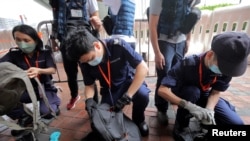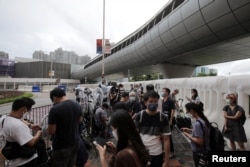At least three freelance journalists have been denied entry to Hong Kong in the past eight months.
The journalists had all covered the 2019 pro-democracy protests, which has led media watchdogs to question whether past coverage was a factor in authorities denying entry.
All three journalists said they were questioned about their past coverage before being turned away.
“Denial of entry is a method routinely used by the Chinese regime to punish foreign reporters seen as too critical. It is now spreading to Hong Kong amidst other violations of the right to information,” Cedric Alviani, the director of the Reporters Without Borders Asia bureau, said in a Friday statement.
“We urge democracies to build up pressure on the Hong Kong government and demand the restoration of full press freedom,” Alviani said.
The most recent entry issue came on August 16 when American freelance photojournalist Matthew Connors was denied entry to Hong Kong. He had also been blocked from entry in January 2020.
Freelance journalist Yoshiaki Ogawa was detained overnight and questioned when he attempted to enter Hong Kong in June. He was forced to return to Japan on June 29.
And freelance photojournalist Michiko Kiseki was detained overnight and questioned before being turned away on December 30, 2022.
In a social media post at the time, she said authorities questioned her about an exhibition of her work, centered on the protests, that had been shown in Japan.
In Ogawa’s case, no reason for the denial of entry was given, according to reports.
VOA reached out to Hong Kong’s National Security Bureau for comment late Friday but as of publication had not received a response. But the city’s authorities have previously said that they adhere to laws and policies.
Following Ogawa’s case, the New York-based Committee to Protect Journalists said that the journalist was returning to Hong Kong to report on how the introduction of the national security law had shaped the city.
Commenting on the case in June, CPJ’s Iris Hsu said in a statement, “Blocking access to foreign journalists reflects Hong Kong authorities’ shameful attempts to stifle critical reporting.”
Enacted in 2020, the national security law criminalizes any act deemed to constitute secession, subversion, terrorism or collusion with foreign forces.
In the three years since the law came into effect, Hong Kong's once-vibrant media scene has become a shell of its former self, media watchdogs and journalists have said.
Hong Kong authorities have dismissed concerns about the law’s effect on media freedoms.
But since it was enacted, around a dozen media outlets have shuttered, with many citing the law as the reason, and several media workers and press freedom advocates have been detained.
And Hong Kong has fallen 67 places on the global Press Freedom Index. It currently ranks 140th out of 180 countries, where 1 indicates the best media environment. In 2019, it ranked 73rd.







